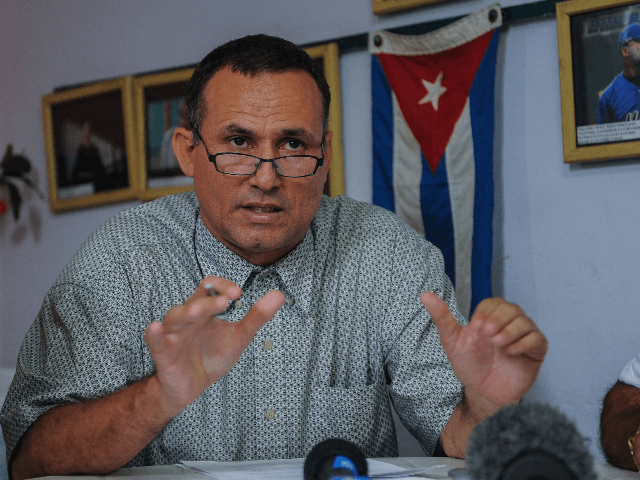Human rights groups revealed Thursday that José Daniel Ferrer, the head of the largest dissident organization in Cuba, is nearing death after a month in prison in which guards are reportedly feeding him rotten food and “semi-fecal” water.
Ferrer heads the Patriotic Union of Cuba (UNPACU), which advocates for democracy and respect for human rights on the communist island. Police arrested him on October 1 after organizing nationwide rallies for free elections on the feast day of Cuba’s patron saint, Our Lady of Charity. Regime officials refused to provide proof of life or any information on his whereabouts after October 4 until Thursday, when his wife and three youngest children were reportedly given five minutes to meet with him.
On Thursday, Cuban Prisoners Defenders, an organization that advocates for the rights of imprisoned human rights activists on the island, detailed the state in which wife Nelva Ismarays Ortega Tamayo found Ferrer. Ortega is a medical professional and identified multiple significant bruises on his body and a host of indications that Ferrer had suffered significant torture while in regime custody.
According to Ortega, Ferrer “looks like a very sick old man.” He reportedly appeared to have lost half of his body weight, could not stand up straight from loss of muscle mass, boasted significant bruising all over his body, and has lost his vision and most of his voice.
Part of the explanation for his extremely deteriorated physical state is that Ferrer said he had been on a hunger and thirst strike for over a month, since October 6. According to a statement from Cuban Prisoners Defenders:
Since they were supplying dirty and/or semi-fecal, fetid and pestilent waters for drinking, and spoiled food that were causing him acute acidity to his already aggravated chronic disease of gastritis and ulcer, with which he already entered prison, José Daniel told his family that he went on a hunger strike – part of the time also thirst strike – for 25 days, which began on October 6 while he was in the Provincial Unit of Criminal Instruction of Santiago de Cuba
Cuban Prisoners Defenders warned that Ferrer was being “slowly murdered” through the poisoning of his food, which he refuses to eat, as well as beatings by prison personnel and the common prisoner they have tasked with torturing him in his cell.
Cuban officials have also tortured Ferrer by keeping him in a cold cell or, on other occasions, leaving him in the hot sun stripped down to his underwear. Ferrer’s family said that he relayed to them he is regularly told he will not leave prison alive.
The Castro regime has also denied medical attention to Ferrer, reportedly only allowing him to see a doctor last Sunday despite being arrested already presenting symptoms of several ailments.
The political prisoners advocacy group published a hand-written letter from Ferrer, which they said a handwriting analyst confirmed was legitimate. It read, in Spanish:
On hunger and thirst strike. They have done everything to me. A thousand tortures and violence. They have dragged me and chained me, hands and feet. They have put me under the sun 15 days in underwear in a cell full of mosquitos and cold in the night. Risk of pneumonia. My life in is grave danger.
Ferrer has not been charged with a crime. Officers have not allowed him to see a lawyer.
Following his arrest, Ortega told Cuban-American media that state security officers warned the government would fabricate charges against Ferrer if he did not stop advocating for human rights on the island.
Ortega and three of Ferrer’s children, all minors including an infant, took the streets of Santiago, eastern Cuba, last week demanding proof of life for their father. The protest, and subsequent arrest and beating by Cuban police, was caught on video.
UNPACU and its allies in the United States have organized a rally to demand freedom for Ferrer on Friday at noon in Washington, DC.
In a statement, the organization thanked international pressure on the Castro regime for Ferrer’s family being allowed to see him.
“We are sure that this visit was ripped from the Cuban communist regime thanks to the solidarity and pressure generated,” the statement read. “But now more than ever we need support, since [due to] the prolonged tortures, humiliation, cruel, inhuman, and degrading treatment to which is he being subjected, it is a question of little time for him to die.”
UNPACU noted that three other members – José Pupo Chaveco, Fernando González Vaillán y Roilán Zárraga Ferrer – have been arrested and disappeared, urging the world to pressure the regime to offer proof of life.
The Organization of American States (OEA), the United Nations, Amnesty International, and other international organizations and NGOs have pressured the Castro regime to stop abusing Ferrer.
Cuba is a member of the U.N. Human Rights Council.

COMMENTS
Please let us know if you're having issues with commenting.